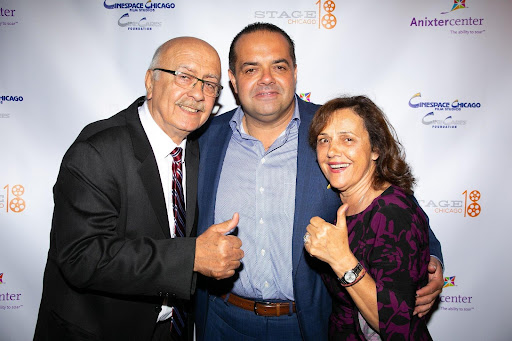To sign up for our daily email newsletter, CLICK HERE
There’s no better proof that the Windy City’s film industry was in deep-dish pizza trouble when the Oscar-winning 2002 film Chicago was filmed in – Toronto. But entrepreneur Alex Pissios is no stranger to rising from the ashes. After getting burned by the 2000s real estate crisis, Pissios bounced back by turning Chi-Town into a cinematic destination for big-time hits like NBC’s Dick Wolf first-responder dramas Chicago Fire, Chicago P.D., and Chicago Med, and big-budget movies like Transformers: Dark of the Moon and Transformers: Age of Extinction.
“The studio chiefs told me, ‘Everything in Chicago is a rip-off,’” Pissios recalls of the obstacles he faced.
But he was determined to get his film business off the ground — for his benefit, and for the benefit of the community.
“If you are not making a difference in the lives of people in your community, then you need to ask yourself what you are really doing,” says Alex Pissios.
 Alex & wife, Patricia, together at a charitable benefit gala (Greek City Times).
Alex & wife, Patricia, together at a charitable benefit gala (Greek City Times).
Cinespace Chicago Film Studios was founded in 2011 by Alex Pissios and his uncle Nick Mirkopoulos. Mirkopoulos and Pissios bought 60 acres of the old Ryerson Steel site in North Lawndale and created the largest independent film studio outside of Los Angeles. The 70-acre facility has hosted over 40 big projects for television and movies.
Alex Pissios, a North and West Side entrepreneur, lost everything in the 2000s real estate meltdown, owing creditors $13 million. He was only 35, his career was over, and his friends had abandoned him. Changing diapers and transporting the kids to school, Pissios spent his days with his wife, a dental hygienist. Then along came his grandfather’s cousin, Nick Mirkopoulos. A successful constructor and developer for many years, “Uncle” Nick had created Cinespace Film Studios, a massive film production complex in Canada, in 1990. Mirkopoulos said he’d heard about Pissios’ problems and had come to help. He assigned his disheartened nephew a task: Cinespace needed a 100,000-square-foot structure in Chicago to accommodate three soundstages.
After college, Pissios had embarked on a promising real estate career. He’d met a few local developers through different jobs and decided to join the fray. He acquired land in Bucktown, built a two-story home on it, and sold it for $100,000. Pissios subsequently built 28 townhomes in Galewood, near his family’s church, Holy Trinity Hellenic Orthodox. But he felt the big prize was around the United Center, which was then under construction. “I drove 20 times a day up and down the streets,” he recalls. He went door-to-door and stopped to talk to individuals watering their lawns.
 Alex Pissios, with his father and mother, Spiros and Olympia Pissios. (Kristan Lieb/Chicago Tribune).
Alex Pissios, with his father and mother, Spiros and Olympia Pissios. (Kristan Lieb/Chicago Tribune).
At the time, Pissios could readily get loans with just 10% down. “It was quite a time,” he says. “It wasn’t just me — the whole banking industry got greedy too.” When the real estate crisis hit, Pissios’ debt began to climb. Lacking funds to file for bankruptcy, he decided to work as a landlord and collect rentals to keep his creditors at bay.
60% of Chicagoans engaged by Cinespace’s philanthropy are engaged by Cinespace production firms or find jobs in the local film business
Enter Nick Mirkopoulos, who covered the bankruptcy charge and hired his nephew to find a location for Cinespace. Pissios called Rich Moskal, the director of the Chicago Film Office, and they spent a few days driving about looking at locations. The studio needed 25- to 35-foot ceilings and plenty of open area for trucks and RVs.
Platinum Equity, which purchased Ryerson, chose to sell one of the metals distributor’s warehouses at Rockwell and Ogden, so Pissios spent two years investigating properties. Mirkopoulos loved the building and the prospect of additional surrounding corporate assets being sold. In the initial facility, local organizations and figureheads helped the studio get a $5 million state subsidy. Cinespace put up $40 million.
Filming in Chicago has a checkered history. It was a popular shooting site in the 1980s and early 1990s, but neighboring states began giving generous tax breaks to production companies, luring them away. Illinois ultimately authorized a 30% tax credit on manufacturing expenses and wages up to $100,000 in 2008. Moskal, who worked at the Chicago Film Office from 1996 until 2018, recalls three soundstage ideas being rejected because they had “no skin in the game.” “Cinespace came in with very serious intent — and money,” he adds. “And a reputation for effectively pursuing and doing business with studios, networks, and producers from Toronto.”
 Alex Pissios with Academy Award winner Christian Bale at Cinespace Chicago Film Studios for Foster Care Awareness month for Chicago nonprofit, SOS Children’s Villages Illinois.
Alex Pissios with Academy Award winner Christian Bale at Cinespace Chicago Film Studios for Foster Care Awareness month for Chicago nonprofit, SOS Children’s Villages Illinois.
Mirkopoulos swiftly put his connections to work, agreeing with Paramount to shoot much of Transformers 3 at Cinespace Chicago. After securing Starz’s Boss, in which Kelsey Grammer played the mayor of Chicago, and Chicago Fire in 2012, his partnership with Lionsgate Television paid off.
Cinespace acquired a second Ryerson warehouse for $1 million with another state subsidy. A third warehouse to the south, a steel-and-glass office building west of Rockwell that houses both the studio staff and the various production companies that operate on-site, two buildings with commercial space that Cinespace leases to camera businesses and other vendors, and a building south of the studio lot but accessible from 17th Street that Cinespace rents to Lagunitas Brewing Company.
But the amenities and tax breaks were only one factor. Camera operators, grips, gaffers, carpenters, and electricians are just a few of the professionals needed to attract production firms. To that goal, Mirkopoulos first offered a year’s free rent to major rental companies like Keslow Camera and Cinelease. Cinespace has now partnered with AbelCine, a digital camera training company; 321 Fast Draw, a whiteboard animation business; and Bam Studios and Periscope Post & Audio, two postproduction firms.
Even the studio’s community service efforts aim to strengthen the local film industry. Since its inception, the initiative has placed 33 West Side youth in a 24-week crew training program. Brown (pictured below) claims 60% of them are engaged by Cinespace production firms or find jobs in the local film business.
 Cinespace Co-Founder Alex Pissios, here with Sheila R. Brown of CineCares (Screen Magazine)
Cinespace Co-Founder Alex Pissios, here with Sheila R. Brown of CineCares (Screen Magazine)
Along with expanding the team, the studio has nurtured creative potential. Mirkopoulos persuaded Pissios to give liberal conditions when DePaul University approached Cinespace about leasing soundstages for its School of Cinematic Arts in 2013. The partnership has benefited DePaul, which now has three soundstages. It was soon named one of the nation’s 25 greatest film schools by the Hollywood Reporter. Graduate Angie Gaffney manages Cinespace’s film incubator program, Stage 18 Chicago, which charges independent filmmakers $350 per day for use of its soundstage. Gaffney hosts networking events and master courses to educate film program members about financial skills. Chicago Media Angels, based at Stage 18, has invested $2 million in new shows.
Cinespace Chicago, founded in 2008, is now one of the world’s largest film production rental facilities, with 31 soundstages in Douglas Park and three more in Little Village. Cinespace also shot Divergent, Batman v Superman: Dawn of Justice, and two Transformers films. Spike Lee shot Chi-Raq at Cinespace, as did the makers of the acclaimed Obama romance Southside With You. Mainstays of the studio include series programming, particularly Fox’s Empire, which rents seven soundstages, and NBC’s Chicago Fire, Chicago P.D., and Chicago Med.
Cinespace is in full production, thanks to Pissios. Alex Pissios has helped move the needle for Chicago in the film business via his community involvement and dedication to giving back. The studios presently contain 36 soundstages. Pissios and Cinespace Chicago Film Studios were featured in the December 2019 issue of Chicago Magazine. Cinespace Chicago Film Studios is the “Hollywood of the Midwest,” reviving a downtrodden area and creating over 15,000 jobs. Pissios’ leadership at Cinespace Chicago has helped the city and state of Illinois earn billions of dollars.
 Alex Pissios is now able to smile at the struggles of his past as he looks forward to helping others persevere through their own struggles in the future the way his Uncle Nick (@alex_pissios on Twitter)
Alex Pissios is now able to smile at the struggles of his past as he looks forward to helping others persevere through their own struggles in the future the way his Uncle Nick (@alex_pissios on Twitter)
“A few years ago, this area we are in was not doing well, jobs had gone away, business activity was slow. North Lawndale needed a boost,” said producer, director, and screenwriter Phillip Koch at a charity event honoring Alex Pissios. “Today, Cinespace is a booming economic generator that hums with jobs, revenue, and huge cultural returns for the city and the state. Cinespace is a game changer.”